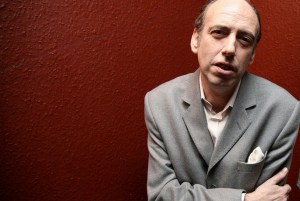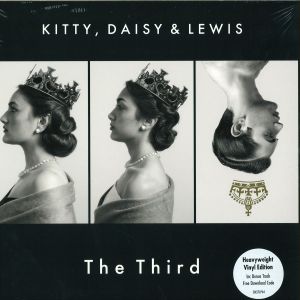The New Sounds Of Kitty, Daisy & Lewis (Interview)
Kitty, Daisy & Lewis have returned with their new album, appropriately titled, The Third. It’s been nearly four years since they released their previous album, Smoking In Heaven. In the interim, the three siblings have been busy touring, writing and building a new studio. The tracks found on The Third are the first results from their new facility and as a result their sound has changed with a greater use of horns and strings and a move away from the vintage blues and rockabilly that they built their reputation on. Also, the trio enlisted former Clash guitarist Mick Jones to produce the record. The 13th Floor’s Marty Duda spoke to Daisy Durham as she and her brother and sister were travelling back to London after a gig in Manchester. Daisy explains how the new studio affected the band’s new musical direction.
Click here to listen to the interview with Daisy, of Kitty, Daisy & Lewis:
Or read a transcription of the interview here:
MD: Been listening to the new album and it’s seems, there’s quite a bit, it’s quite a departure from what you guys have done in the past and so I’m hoping you can fill me in about that. But first of all, can you tell me about the studio that you guys have built. I understand there’s about, each of you have your own floor. Is that what’s happening?
DD: No, we don’t live there. It’s just a studio.
MD: Right.
DD: Yeah it was like an old Indian restaurant and it think it was shut about 10, 15 years or something. My dad actually ate there a couple of times when it was open so he was kind of aware about the building and stuff.
MD: Right.
DD: And then when we saw it was up for auction, we were like really interested to get in it and we did. And it was in like such a bad derelict state. It took like a 3 years to build before we could actually get in and start recording.
MD: Right.
DD: Yeah there were like pigeons there and old magazines up the chimney and stuff.
MD: Right.
DD: Yeah.
MD: And is it an analogue studio?
DD: Yeah, it is, yeah.
MD: Oh okay.
DD: We were using an eight-track machine before but we got a hold of a sixteen-track. So that’s kind of why our sound is kind of developed a lot.
MD: Okay.
DD: Our production’s kind of bigger cause’ they’re able to like experiment with more instruments and stuff.
MD: Right.
DD: Backing vocals and things like that.
MD: Gotcha, I see.

DD: Yeah and also we got Mick Jones to produce it.
MD: Right. There is that as well, yeah.
DD: Yeah basically like the last few months of the building work, we just spent like loads of time rehearsing with Mick and he like rehearsed with us by playing along just so he could learn the songs like inside out.
MD: Right.
DD: So he knew them as well as we did, yeah.
MD: Oh okay. How did you get hooked up with Mick Jones initially?
DD: We kind of just like known him from around. We played one of his club nights like years ago. So we kind of knew he was into our music and then at Notting Hill carnival, Lewis asked him if he’d be up for producing us and yeah he was interested. He came around and we played him the songs and stuff.
MD: Right.
DD: Yeah he just really liked the music and he was like I’m in.
MD: And what did he add to the production do you think?
DD: Mainly like just his positive energy. Yeah he was always just like making us relax. I guess that if we were getting bored of the songs, he just like kept the spirits up. Yeah.
MD: Alright.
DD: Just a good person to have around and became like part of the family.
MD: Right. Alright and it’s my understanding that you guys took a trip to India at some point in the recent past, a vacation or holiday or something. I was wondering if that had any influence on the sound of the record.
DD: Yeah, I don’t know. Yeah that trip to India was quite good. Basically like we were going to play a festival which got cancelled but our flights were booked anyway.
MD: Right.
DD: So we decided to go. My dad’s Indian.
MD: Right.
DD: And there was this guitar that he had as a kid. So we kind of like went on a little mission there to find this lost guitar. We went to like this, we thought it might have been this old people’s home where this guy had it who had died, but yeah it wasn’t there.
MD: It wasn’t there. So you came away empty handed?
DD: Yeah. They found a guitar and we got all excited and then they brought it out and it was like some 80s thing.
MD: No that’s not what you want. What did you think of the country in general though?
DD: Yeah loved it. Very run down and crazy drivers.
MD: Sounds like Auckland, not the run down part but the crazy drivers. Anyway, and speaking of driving, I understand that Lewis drives the band around in a Hearse. Is that right?
DD: Well I wouldn’t say Lewis drives us around. Yeah basically we bought it because it fit the double bass and the keyboard in the back.
MD: Right.
DD: And that was like before we started hiring vans and stuff.
MD: Right.
DD: But yeah, now it’s just a family car.
MD: The Hearse is a family car?
DD: Rarely, rarely use it anymore.
MD: Oh well yeah that’s understandable.
DD: We only really use it like going to the dump yard.
 MD: Right. So when you were making the new record, The Third, was there a conscious effort to kind of get away from the sound that you guys, you know, the vintage rockability and Blues things you were doing on the first two albums and kind of try out other things?
MD: Right. So when you were making the new record, The Third, was there a conscious effort to kind of get away from the sound that you guys, you know, the vintage rockability and Blues things you were doing on the first two albums and kind of try out other things?
DD: No I mean theres still a couple of like Blues kind of tracks in there.
MD: Right.
DD: I guess just like our song writing kind of…because of like the way we recorded this one, using more instruments and stuff, we were able to develop other sounds. Before we had a tiny room and we only had 8 tracks and all that playing together in one room, it just naturally had a different sound. Yeah I think like the way we recorded it and the way we’ve written it and also we’ve grown up, a discovered other things. Yeah, I guess we put more vibe into this one.
MD: Right. Like a song like No Action, that seems like that’s a kind of new musical territory for you. It’s very kind of moody and you’ve got all these strings. It’s more like a Soul tune than say something Blues…
DD: Yeah. If you stripped it back, took away the strings, took away the backing vocals, took away all these things, people would probably still wouldn’t see it the same way.
MD: Right.
DD: Like Don’t Make A Fool Out Of Me or Messing With My Life or something, if we had added like strings to that people would probably call it Disco or whatever. So I think it’s like a lot of it is to do with the production.
MD: And I guess another one that is kind of different is Never Get Back which is almost like a torch song.
Listen to Never Get Back here:
DD: Yeah that’s one of Kitty’s.
MD: One of Kitty’s?
DD: Yeah.
MD: So…
DD: Every song is completely different.
MD: Right.
DD: But Never Get Back kind of reminds me of like a Julie London kind of thing.
MD: Yeah, exactly. So your fans that are kind of used to seeing you, how are they reacting to these new sounds you’re making?
DD: Yeah it seems to be like going really well at the moment.
MD: Right.
DD: And at the live…well I mean we’ve only done 3 as I said and everyone’s sort of like singing along to all the songs, which is great. Like with the last one it took sort of a while to kind of get to that point. So I think yeah, everyone seems to have listened to the album and seem to be liking it.
MD: Well there’s quite a bit of time that went past between this album and the previous one, like 4 years or so. Was that because of the studio being built or were there other things that were going on as well?
DD: Yeah, mainly just the studio being built. Also while it was being built we were gigging as well and also like the writing just kind of happens over time. We don’t really sit down and write an album, we just write songs…
MD: I’m sorry, I lost that last bit there, can you repeat it.
DD: Yeah we just all write songs individually, you know, in time.
MD: Right, okay.
DD: Not really something that you can rush.
MD: And I know you’ve been to Auckland and to New Zealand several times. I think the last time you were here you played at The Powerstation and pretty much filled up the place. So I was wondering if there are plans for you to return to this part of the world at all.
DD: Oh yeah definitely. I mean, it’s all still being put in place.
MD: It’s still being put, okay.
DD: Yeah. But hopefully it won’t be too long before we can start announcing.
MD: Alright, and so you’re headed from Manchester, where are you going to next? Is it London?
DD: We’re coming back from Manchester, yeah we’re going to London, which we’re really excited about to play in Camden where we grew up and where we still live. Yeah it’s been a long time since we’ve played in London.
MD: So do you get a lot of people you went to school with and stuff show up and the shows when you’re playing in Camden?
DD: Yeah Lewis is still in touch with quite a lot of his school friends. I don’t really see many people from school anymore.
MD: Right.
DD: Cause that was a long time ago.
MD: Right.